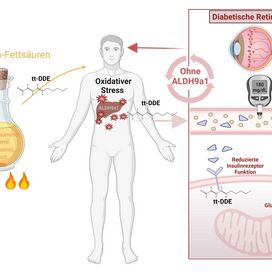
Mannheim/Heidelberg, 19.12.2023
Omega-6 Fatty Acids and Cardiovascular Disease
What role do omega-6 fatty acids play in cardiovascular disease and diabetes? Scientists from Mannheim, together with researchers from Heidelberg, Frankfurt and Hangzhou in China, have investigated the breakdown of omega-6 fatty acids and gained new insights into how their oxidation products influence the metabolism. Under the leadership of Professor Dr. Jens Kroll from the European Center for Angioscience (ECAS) of the Medical Faculty Mannheim, Heidelberg University, the researchers identified a breakdown product of omega-6 fatty acids and developed a model in zebrafish to examine the undesirable effects of this oxidation product, known as tt-DDE (for trans,trans-2,4-decadienal).
more
München, 21.11.2023
Sugar Tax Could Save As Much As 16 Billion Euros
A simulation study conducted by a team from the Technical University of Munich (TUM) demonstrates that a soft drink tax in Germany would have significant positive effects. In all of the simulated variants evaluated, less sugar was consumed and the rate of illness dropped. This would be a way to reduce costs to the national economy and alleviate the burden on the health care system. There is, however, a difference between taxes aimed at reducing soft drink consumption and taxes aimed at bringing about changes in product formulation.
more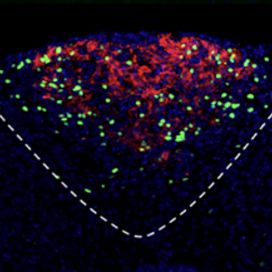
Neuherberg, 09.11.2023
Understanding the Role of GIP in Managing Diabetes and Obesity
The increasing amount of patients with obesity and type 2 diabetes benefit greatly from the recently developed GIPR:GLP-1R co-agonists. These novel compounds lead to substantial weight loss, offering a revolutionary approach to patients worldwide. Although the hormone glucose-dependent insulinotropic polypeptide (GIP) was already shown by Helmholtz Munich scientists to decrease body weight via the brain GIP receptor, the underlying neurons through which GIP acts in the brain remained unknown. Scientists led by Dr. Timo Müller from Helmholtz Munich and the German Center for Diabetes Research (DZD) have now discovered that GIP decreases body weight by interacting with specific inhibitory neurons in the brain. These new findings are published in 'Nature Metabolism'.
more
Hamburg / Düsseldorf, 09.10.2023
Dr. Theresia Sarabhai Receives EASD Rising Star Award 2023
The European Association for the Study of Diabetes (EASD) has named Dr. med. Theresia Sarabhai as the recipient of its Rising Star Award 2023. In conjunction, Sarabhai also received a coveted EFSD Fellowship for her research on insulin resistance in adipose tissue.
more
Tübingen /Düsseldorf, 05.10.2023
New Consensus Report: an Important Step Towards Precision Medicine in Diabetes
In recent years, new insights have been gained into the heterogeneity of diabetes and its impact on the risk of complications. This is resulting in new ways to prevent and treat diabetes. A new consensus report on precision medicine in diabetes prevention and therapy has now been prepared by international scientists with the participation of DZD researchers and published in the scientific journal 'Nature Medicine'. The report identifies ways in which precision medicine in diabetes can be integrated into clinical practice immediately or in the short term, while highlighting critical knowledge gaps that need to be addressed.
more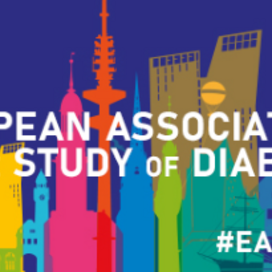
Hamburg, 01.10.2023
EASD Annual Meeting 2023: Several Awards for DZD Researchers
The annual meeting of the European Association for the Study of Diabetes (EASD) will be held in Hamburg this year. A scientific programme with more than 1,200 lectures and presentations on the latest findings in diabetes research awaits participants in the Hanseatic city from 2 to 6 October 2023. DZD researchers can look forward to several EASD awards at the conference.
more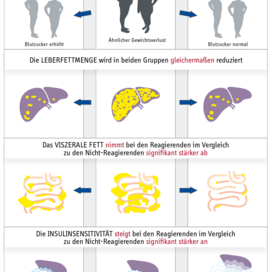
Tübingen, 26.09.2023
New Study Advocates Remission as Therapeutic Goal in Prediabetes
Prediabetes is a condition that precedes type 2 diabetes and increases the risk of heart attack, kidney and eye disease, and several types of cancer. Currently, there is no approved drug therapy for prediabetes available. Scientists at the German Center for Diabetes Research (DZD) now show how and by which mechanisms prediabetes can be brought into remission, i.e. into a state in which blood glucose levels return to normal. The multicenter study of the DZD also shows that remission of prediabetes protects against type 2 diabetes and is associated with better kidney and vascular function in the long term. Interestingly, the underlying mechanisms are different from those in type 2 diabetes remission, the researchers report in 'The Lancet Diabetes & Endocrinology'.
moreNeuherberg / Potsdam-Rehbrücke, 20.09.2023
Exercise and Muscle Regulation: Implications for Diabetes and Obesity
How do our muscles respond at the molecular level to exercise? Researchers at Helmholtz Munich and the German Institute of Human Nutrition (DIfE) have unraveled the cellular basis and signaling pathways responsible for the positive impact of physical activity on our overall health. Regulatory T cells, a type of immune cell, play a critical role in ensuring proper muscle function. These novel insights are paving the path towards precision medicines targeting metabolic disorders like obesity and diabetes, as well as muscle-related illnesses. Their discoveries are published in 'Cell Metabolism'.
more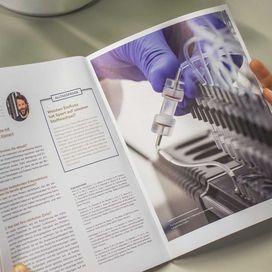
Potsdam-Rehbrücke, 07.09.2023
DIfE Annual Report 2021-2022 published
How do we eat in harmony with our inner clock? Which diet promotes healthy aging? And what influence did nutrition have on our well-being during the pandemic? The new annual report of the German Institute of Human Nutrition Potsdam-Rehbrücke (DIfE) provides information in the proven magazine style about these and other selected research highlights as well as the diverse activities of the institute in 2021 and 2022.
more
Potsdam-Rehbrücke, 24.08.2023
Expression Patterns of Key Receptors Revealed in the Hypothalamus
There is mounting evidence that gut-derived peptide hormones significantly affect the entire body. By binding themselves to the respective receptors in the brain, the hormones can, among other things, modulate food intake and metabolic parameters. However, to date, the role played by these peptide receptors during critical developmental phases has been the subject of very little research. Researchers from the Junior Research Group of Neurocircuit Development and Function at DIfE took a closer look and investigated the expression patterns of key receptors in the hypothalamus of mice. Their newly acquired knowledge was published in the journal ‘PLOS One’.
more
Leipzig, 27.07.2023
Antje Körner to Head the Metabolism Division at HI-MAG
Prof. Dr. Antje Körner started as head of the Metabolism Division at the Helmholtz Institute for Metabolic, Obesity and Vascular Research (HI-MAG) on July 1, 2023. Professor Antje Körner, a renowned scientist and pediatrician, has joined HI-MAG as the head of Metabolic Research with a joint professorship at the University of Leipzig .
more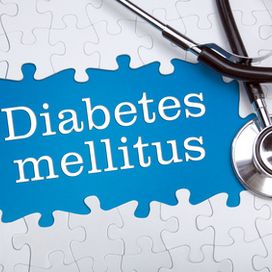
Munich, 04.07.2023
Health Economic Impact of Improved Risk Factor Control in Type 2 Diabetes
According to the German Federal Ministry of Health (BMG), around 7.2 percent of adults aged 18 to 79 in Germany suffer from diabetes mellitus. 90 to 95 percent of them have type 2 diabetes. It is caused on the one hand by a reduced sensitivity of the body's cells to insulin (insulin resistance), and on the other hand by years of overproduction of insulin, which leads to "exhaustion" of the insulin-producing cells, so that the pancreas cannot supply enough insulin to meet the increased demand. In addition to a hereditary predisposition, obesity and lack of exercise are considered the most important contributors to type 2 diabetes.
more
Potsdam-Rehbrücke, 20.06.2023
DIfE is Participating in the OBELISK Project for the Prevention of Childhood Obesity
To help prevent a further dramatic increase in obesity, a new European research project aims to tackle the disease during childhood. To mark the start of the five-year OBELISK project, which involves researchers from the German Institute of Human Nutrition Potsdam-Rehbrücke (DIfE), the international consortium met for the first time at the start of June in France.
more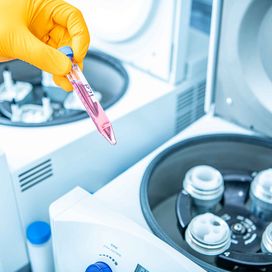
Neuherberg, 05.06.2023
Unraveling the Mode of Action of Tirzepatide
Tirzepatide is a recently approved treatment for type-2 diabetes. Treatment with tirzepatide decreases body weight while improving glucose metabolism in patients with obesity and type-2 diabetes. Although the drug is designed to activate receptors for glucagon-like peptide-1 (GLP-1) and glucose-dependent insulinotropic polypeptide (GIP), the contribution of activating the GIP receptor in the overall efficacy of tirzepatide is not fully understood. A team of researchers demonstrated for the first time that tirzepatide stimulates insulin secretion in the human pancreas via the GIP receptor. These results contrast with findings in mice, where tirzepatide primarily stimulated insulin secretion via the GLP-1 receptor. This study is now published in 'Nature Metabolism'.
more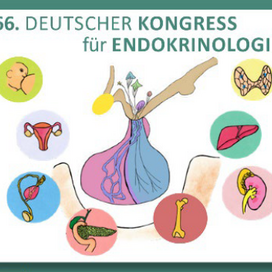
Baden-Baden, 31.05.2023
Diabetes Begins in the Brain – The Latest Research Findings at the DGE Congress
The brain determines whether the metabolism is functioning. If it does not react with sufficient sensitivity to insulin, liver, adipose, and muscle tissues are unable to absorb enough glucose causing an increase in blood sugar levels. This can result in weight gain and type 2 diabetes. At the German Center for Diabetes Research, researchers from the fields of neuroscience and diabetology work closely together. At a fascinating symposium at the 66th German Congress of Endocrinology, from July 5–7 in Baden-Baden, they will shed light on how the central nervous system controls the peripheral energy and glucose balance
more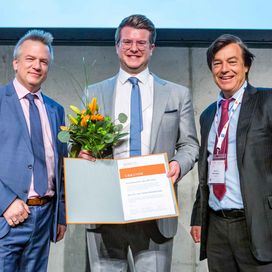
Berlin / Düsseldorf, 25.05.2023
Focus on Subcutaneous Adipose Tissue: DDG Doctoral Prize for Dr. Kálmán Bódis
The young researcher Dr. Kálmán Bódis was awarded the German Diabetes Association (DDG) doctoral prize for his doctoral thesis investigating the effects of lipid and energy metabolism disorders on subcutaneous adipose tissue associated with recently diagnosed type 2 diabetes. The award ceremony took place on May 18 during the DDG congress in Berlin.
more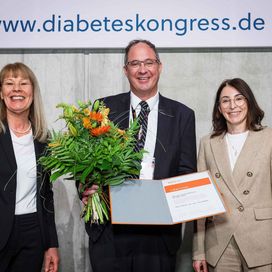
Berlin / Neuherberg, 22.05.2023
Timo Müller Awarded with Werner Creutzfeldt Prize
The German Diabetes Association (DDG) awards this year's Werner Creutzfeldt Prize to Helmholtz Munich scientist PD Dr Timo Müller for his exceptional work in the research field of Incretin-based diabetes and obesity. This is already the second time in a row, that a scientist from Helmholtz Munich has been awarded with this prestigious award for their research on diabetes mellitus. Last year's Werner Creutzfeldt Prize went to Prof Dr Stephan Herzig, Head of the Helmholtz Munich Diabetes Center and Director of the Institute for Diabetes and Cancer. This highlights the outstanding expertise in the field of diabetes research at Helmholtz Munich.
more
Düsseldorf / Berlin, 18.05.2023
Diabetes Subtypes: The DDZ Presents an Innovative Clustering Tool for Diabetes Professionals
Classifying diabetes mellitus into subtypes can be the basis for the tailored management of those affected consistent with “precision diabetology.” The goal for the future is early detection of diabetes-related secondary diseases and complications of diabetes. On this basis, the German Diabetes Center (DDZ) developed a clustering that will be presented for the first time by DDZ speakers at the annual congress of the German Diabetes Association in Berlin.
more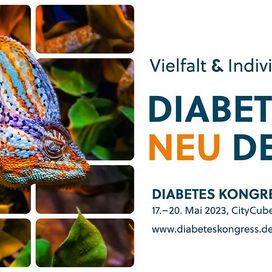
Berlin, 16.05.2023
DDG Diabetes Congress 2023: “Diversity & Individuality – Rethinking Diabetes”
Under the banner “Diversity & Individuality – Rethinking Diabetes”, the 57th annual conference of the German Diabetes Association (DDG) will take place in Berlin from May 17 to 20, 2023. Researchers from the German Center for Diabetes Research (DZD) will also present their latest research findings. The featured topics from the DZD will include new approaches for precise therapies and diabetes prevention.
more
Neuherberg / Düsseldorf, 10.05.2023
diabinfo in Dialog 2023: Exercise as a Miracle Cure
How does physical activity affect blood sugar levels? Do different things have to be taken into account depending on the type of diabetes? How can I incorporate regular exercise into my daily routine? On June 15, from 4 pm to 6 pm, the national diabetes information portal diabinfo.de extends an invitation to its digital forum “Diabinfo im Dialog”. Through specialist lectures and a discussion panel, we will take a comprehensive look at the topic “Exercise as a Miracle Cure” together with viewers.
more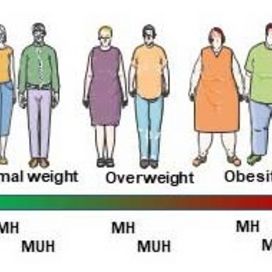
Tübingen / Potsdam-Rehbrücke, 06.05.2023
Metabolic Health and Cardiometabolic Risk Clusters Help to Remodel the Prediction and Therapy of Cardiometabolic Diseases
Lean, metabolically unhealthy, people have a risk of cardiovascular disease (CVD) that is higher than the risk observed in obese, metabolically healthy people. Recently, novel cluster analyses (computer-based grouping of people) also identified a large heterogeneity in the risk of type 2 diabetes and CVD and of their treatment response. These findings reveal that there may be a huge, yet undetected, treasure to be lifted in the field of cardiometabolic research. In a Review article in 'Lancet Diabetes & Endocrinology', Norbert Stefan from Helmholtz Munich, the German Center for Diabetes Research (DZD) and the University of Tübingen, and Matthias B. Schulze from the German Institute of Human Nutrition Potsdam-Rehbruecke and the DZD highlight how these novel risk stratification concepts can help to better implement precision medicine in clinical practice.
more
Berlin / Neuherberg, 28.03.2023
German Centers for Health Research Support Declaration on Patient Participation of the Health Research Forum
Patients can participate in medical research as active partners. Researchers should consider their needs and their unique expertise in the research process, as it is a valuable resource. The Health Research Forum published a statement on patient participation and calls for it to become the standard for patient-centered health research.
more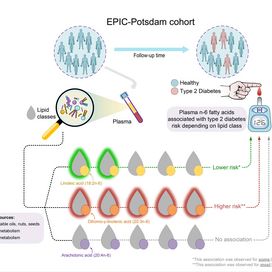
Potsdam-Rehbrücke, 23.03.2023
Type 2 Diabetes: Omega-6 Fatty Acids in Lipid Fractions as a Biomarker for the Risk of Disease
Polyunsaturated omega-6 fatty acid levels have previously been linked to the risk of developing type 2 diabetes. But what matters is which class of plasma lipids is being looked at. Certain lipids can act as biomarkers to better assess the influence of diet and fat metabolism on the development of the disease. These are the findings of the team comprised of Marcela Prada, Fabian Eichelmann and Matthias Schulze from the German Institute of Human Nutrition Potsdam-Rehbruecke (DIfE), a partner institute of the German Center for Diabetes Research (DZD) e.V., published in the journal ‚Diabetes Care‘.
more
Neuherberg, 20.03.2023
Overcoming Professional Boundaries - DZG Fund Joint Project on Gene and Cell Therapy
This is what ideal medicine would look like: Doctors could specifically alter molecular processes in diseased cells in the body and thus causally cure patients. This is the goal of the German Centers for Health Research (DZG) in the project "Cell type specific targeting for future in vivo delivery in cell and gene therapy". The funding, awarded for the first time, comes from the DZG Innovation Fund.
more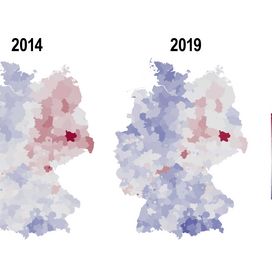
Düsseldorf, 20.03.2023
Falling Incidence of Type 2 Diabetes Despite High Prevalence – A Reason for Hope?
Using the sixty-three million people with statutory health insurance as a basis, the German Diabetes Center (DDZ) has compiled the first study of trends associated with the incidence of type 2 diabetes (T2D) in Germany over a period of six years. The findings show a decline in the number of new cases in almost all 401 administrative districts and urban municipalities, as well as nationwide. In contrast, an increase in the number of cases in younger age groups was observed.
moreNeuherberg, 07.03.2023
Cited1 Links Sex and Metabolic Hormones to Protect Against Obesity
Sex differences exist in the regulation of energy homeostasis, the organism’s mechanism to keep a stable body weight. Current studies indicate for instance that female mammals, including humans, are better protected against metabolic diseases during reproductive age. This is particularly important with regard to obesity, a noncommunicable disease whose prevalence has tripled since 1975 according to the World Health Organization (WHO). However, it is still not fully understood how hormones, released by sex-specific reproductive glands, signal to the brain to regulate energy metabolism in females versus males. Researchers at Helmholtz Munich pursued the question and discovered a new protein called Cited1 within hypothalamic neurons that is involved in the regulation and sensitivity of satiety pathways. The results are now published in 'Cell Metabolism'.
more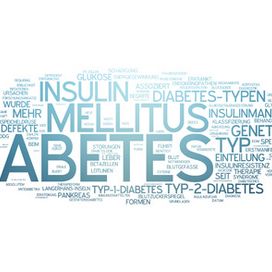
Augsburg / Neuherberg, 14.02.2023
Insulin Secretion: Messages from Adipose Tissue
Scientists at the University of Augsburg and Helmholtz Munich have made an important breakthrough in better understanding early processes in the development of type 2 diabetes by identifying a previously unknown transmission of messenger substances from adipose tissue to the pancreas. In a publication in 'Nature Communication', the team led by Prof. Dr. Kerstin Stemmer was able to show that adipose cells release tiny lipid membrane particles known as extracellular vesicles into the blood, which can stimulate the release of the blood sugar-lowering hormone insulin from the pancreas.
more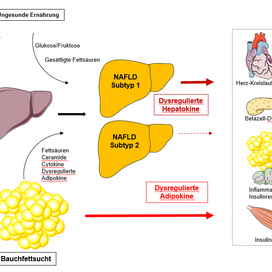
Munich / Tübingen, 07.02.2023
NAFLD - Hepatokines Mediate its Impact on Metabolic Diseases and Help to Identify Subtypes
Non-alcoholic fatty liver disease (NAFLD) is an important risk factor for type 2 diabetes and cardiovascular diseases. In a Perspective in Cell Metabolism, Norbert Stefan from the University of Tübingen, Helmholtz Munich and the German Center for Diabetes Research, Morris F. White from the Harvard Medical School, and colleagues first highlight the dysregulation of hepatokines – proteins released from the liver – in people with NAFLD. Then, they discuss pathomechanisms of type 2 diabetes and cardiovascular diseases specifically related to NAFLD by focusing on hepatokine-related organ crosstalk. Finally, they propose how the determination of major hepatokines and adipokines (proteins released from fat) can be used for the identification of subtypes of people with NAFLD, to better implement precision medicine in clinical practice.
more
Düsseldorf, 11.01.2023
Not Only a Complication of Diabetes: Environmental Pollution Identified as a Trigger for Sensorimotor Polyneuropathy
Recent results from the prospective population-based KORA F4/FF4 study have linked environmental risk factors with the onset of distal symmetrical polyneuropathy (DSPN) for the first time. Researchers of the German Diabetes Center (DDZ) in cooperation with Helmholtz Munich were able to determine that people with obesity are at greater risk of developing DSPN.
morePress contact

Birgit Niesing
niesing(at)dzd-ev.de
+49 (0)89 3187-3971

Dr. Astrid Glaser
glaser(at)dzd-ev.de
+49 (0)89 3187-1619
Media Library
